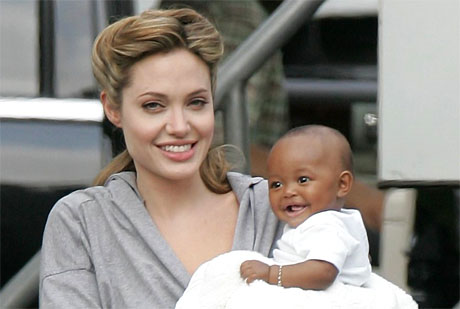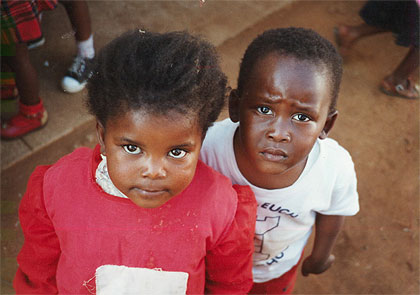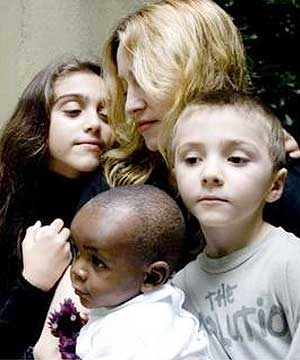Angelina Jolie, Madonna, Oprah and African children: On Media Fairy Tales, Personal Blessings and the Ongoing Curses of Africa
by: Olivier Tchouaffe / FLOW Staff

The recent adoption of African babies by the high-priestesses of Western pop-culture and reputable international human-right dignitaries, such as Angelina Jolie and Madonna, are powerful demonstrations of their thought-through positive actions against any negative preconceptions of African children. These acts are neither banal nor are they cheap, political attention-grabbing stunts. Rather, they are powerful interventions that have the potential to inject, inspire, embolden, and accelerate processes of cross-cultural understanding between the West and Africa. Moreover, these adoptions could engender a deeper mutual beneficial process of cultural exchange. It is likewise understandable to, at the same time, marvel at the spectacle of Jolie and Madonna flying their newly adopted children out of the continent so that they might now live the American Dream (happily ever after, of course).
This piece is neither intended as a diatribe against adoptions in Africa nor is it demanding that these kinds of adoptions be suspended. The aim of this column is admittedly quite modest: I wish to point out the important symbolic ramifications and the paradoxes embedded in these adoptions; complications that are significant enough to render them counterproductive. Specifically, these adoptions carry with them the linkages between colonization and neo-colonialism in contemporary Africa. The continent's racist colonial political-economy past lives on in these gracious acts. Specifically, Africa's long history of enslavement has been counteracted by the colonial myth of the “exceptional negroes” which is the difference between the negroes who are allowed to live and those who are merely allow to exist [i].

This culture of exceptionality confirms the rule of colonization and neo-colonialism. In the Darwinian colonial culture, the truly “blessed” are the ones allowed to survive. It is not farfetched then to think that these adopted babies are somehow “exceptional” and “blessed” since they alone were handpicked by two goddesses of Western pop culture. These cultural dynamics are at work since these children are now media celebrities and they are positioned as being “unlike” the other negroes and therefore somehow deserving their piece of the American Dream. Obviously their random selection does nothing to explain why their compatriots remained mired in their native continent “[ii].
These adoptions are read as being unfair because they perpetuate the overplayed myth of the “exceptional negro” which unfairly characterizes the remaining African youth as somehow being less exceptional and therefore less worthy of aid. These cultural antagonisms play out within the colonial imagery of the “white man's burden”; or, in this case, the “white women's burden”. Arbitrarily selecting “exceptional negroes” from their native communities, and then granting them access to upper-Middle class privilege emphasizes that life is merely a game of chance. So as these select few will never again be hungry, the remaining African children continue to sweat out their day-to-day struggles in their poverty-ravaged continent. Additionally, these adoptions do not suggest that these humane extractions will galvanize a social movement that might result in a better life for those left behind.
It is untenable to demand that Jolie and Madonna adopt all of Africa's babies, or to prohibit these kinds of media-centric adoptions altogether. The key question here is, what do these celebrities adoptions really do for African children?

Adoption as a form of extraction does not address the problem because retrieving children from their homes in no way contributes to making any community better. On an individual level these children, and perhaps even their biological families' situations might improve, however, the larger community rarely if ever benefits from celebrity beneficence.
One might legitimately ask, why didn't Madonna simply give the boy's family money, or start a business and give it to them there in Malawi? Why did she take a child whose family is still alive and living in poverty? Angelina Jolie and Madonna's Human Right activities are indeed admirable. They have both addressed important issues like land mines and HIV/AIDS before the UN. I believe, however, that their contributions could have been considerably more powerful if they had instead made strong cases against Africa's many health/political/economic atrocities. By adopting needy babies, these women suggest that the only way to help the situation is for responsible and affluent whites to rescue “worthy” African babies. This charity reinforces the fallacy of neo-liberal individualism; namely, singular interventions are a panacea to an entire corrupt system. In the end, the “exceptional negroes” are not really blessed because they become complicit in their peers' suffering as they are unwitting accomplices to this kind of shortsighted ideology.
The “Oprah Winfrey Leadership Academy for Girls in South-Africa”, inaugurated on Tuesday, January 2, 2007, aspires to improve the educational hopes of poor girls in South Africa. Building schools in Africa has a better impact on the whole community because it allows more than one negro to become “exceptional”. (I understand that Oprah's action is controversial because she has been accused of not doing enough for Black inner-city children here at home[iii]). Additionally, Oprah's method may very well prove to be more beneficial for African communities as the children educated at her school will stay/return after they receive their higher education and function productively within their native communities. This stands in stark contrast with the very few children who are airlifted from the continent, will (likely) become estranged from their home continent and native language and culture.
These celebrity African adoptions are complex cultural gestures that come packaged with their own sets of historical dramas which foreground racial exclusivity, personal blessings, continental curses and the everyday life. Paradoxically, these complexities guarantee that these adoptions are not simple moments of hope but of the expression of reified colonial power relationships between Africa and the West.
Notes
[i]Jerry Gafio Watts: Amiri Baraka: The Politics and Art of the African intellectuals. P.57-58
[ii]According to The Independent, there are more than 1 million orphans in Malawi alone. About 1 in 5 of all children are orphans: The Independent.co.uk
[iii]See Oprah Winfrey, Bill Cosby Face Growing Challenge by Black Professors – Marc Lamont Hill and Boyce Watkins Appear on CNN to Discuss Concerns: webmetricsguru.com
Image Credits:
1. Angelina and Zahara
2. “Exceptional Negroes”
3. Madonna and David
Please feel free to comment.
International Adoption
Olivier’s observations carry additional significance in light of China’s recent restrictions on the adoption of female orphans by foreign parents. The media emphasis on these celebrity adoptions may cause many parents who do not want to wait for a Chinese child to look to Africa.
This issue raises troubling questions about choosing an orphan based on his or her country of origin. Will African children replace Chinese children, who in turn displaced orphans from former Soviet nations as the child of choice? What are the ramifications of parents who are able to select the race of their child? Is it a decision grounded in the politics of the child’s home country? How does gender preference factor in? Are there discernible patterns in terms of what elements from the child’s native culture the parents are willing to study and adopt as well?
Celebrities have been adopting children for decades. This new media emphasis on these African children raises larger questions about the factors that influence internationa adoption.
What prohibits upper-middle class Americans from adopting American children? I have heard all maner of urban folklore: all the babies are exposed to crack – avoiding the nightmare of biological parental involvement, etc. The airlifting of black babies from Africa is just creepy. Is there also invested in this action some sort of essentalist perversion? How does a black baby born in Malawi, malnourished for the first few months of its life become more desirable that a black baby born in Hollywood, Florida?
Upper Class Americans
In response to Coleen’s comment, there are actually approximately 2 million domestic adoptions yearly compared to about 20,000 international. If she’s refering to transracial US adoption, it’s, actually, not always so easy for white parents to adopt African-American children. With good reason, birth mothers often choose African-American couples over white parents and institutionally there has been a traditional resistance to placement of black children in white families. White parents are often seen as “unfit” for the task of raising black children in America. In 2004, 26 percent of black children adopted from foster care, about 4,200, were adopted transracially, nearly all by whites. The 2000 census — the first in which information on adoptions was collected — showed that just over 16,000 white households included adopted black children. While this number doesn’t compare to numbers of international adoption, there are practical aspects of deciding between domestic and international adoption that likewise influence families’ choices.
The paradox of adoption is that while you envision your decision not to bring more people into an overpopulated and impoverished world as somehow ethical, you likewise grapple with the selfish, immoral and coercive implications of raising a child that is not biologically—or nationally—your own. Our decision was made purely on numbers. We considered various domestic and international programs, evaluating where conditions seemed most urgent. There are currently an estimated five million orphans in Ethiopia, so we went with Ethiopia. Moreover, adoption and humanitarianism aren’t mutually exclusive. Many international adoption agencies also support humanitarian projects, like Oprah’s school praised above. Granted, aid projects have traditionally contributed to the maintenance of imperialist hegemony (as will Oprah’s), yet they also bring immediate and often physical benefits to real people (as will Oprah’s). I agree that in an increasingly globalized world it is, indeed, important to think reflectively about all our actions. But at the same time, dismissing transracial international adoption as blanketly “creepy,” as in the comment above, reflects a far more insidious and less productive absence of criticism
Oprah’s school is controversial, too
Although there was a side point about how Oprah’s school is controversial because it provides aid to women in Africa, instead of inner city children, I think that her school is more problematic for other reasons. There have been many complaints about how the school is overly strict- not giving the parents sufficient visiting time, nor allowing the girls to have treats. It seems to me that Oprah’s school represents colonialist arrogance because she is enforcing her own ideology on this group of girls. Additionally, this school is a leadership school for girls. Although this could be seen as feminist, I would argue that this is not. Feminism is for the equality of men and women; by promoting one gender she is creating a new inequality- girls with Oprah’s leadership skills.
I think it is very problematic that Oprah took this welfare to Africa, instead of creating a school in the U.S. Americans frequently try to fix other people’s problems before we even have our own figured out. Additionally, by bringing our version of help to another country we may be imposing our own cultural beliefs, instead of creating aid that is asked for and fits into the current cultural structure.
As for Angelina Jolie and Madonna, while their aid has been impressive, I agree that it puts the focus on babies- instead of older children and adults. While adoption is a nice idea, I agree that it does not help the majority of the people.
Let me ask you all one important question: what have you done to help? Is the value of one life not important? A child in an orphanage, in any country, is less likely to thrive and survive than a child raised in a family of at least average means. Do something–anything–to help provide a better life for children in need. Quit griping, get off the computer, and start–if not now, when?
Signed, an American born mother to an adopted Ethipian baby, a social worker of 17 years US experience
i just feel that your point of views are good but i would like to know who is an african child?/ please let me know with immediate effects. thankyou in advance
that is a very nice thing to do that just show us africans how wonderful you are god blesssssssssssssssssssss you
You write well but you refer to them as goddesses too much.